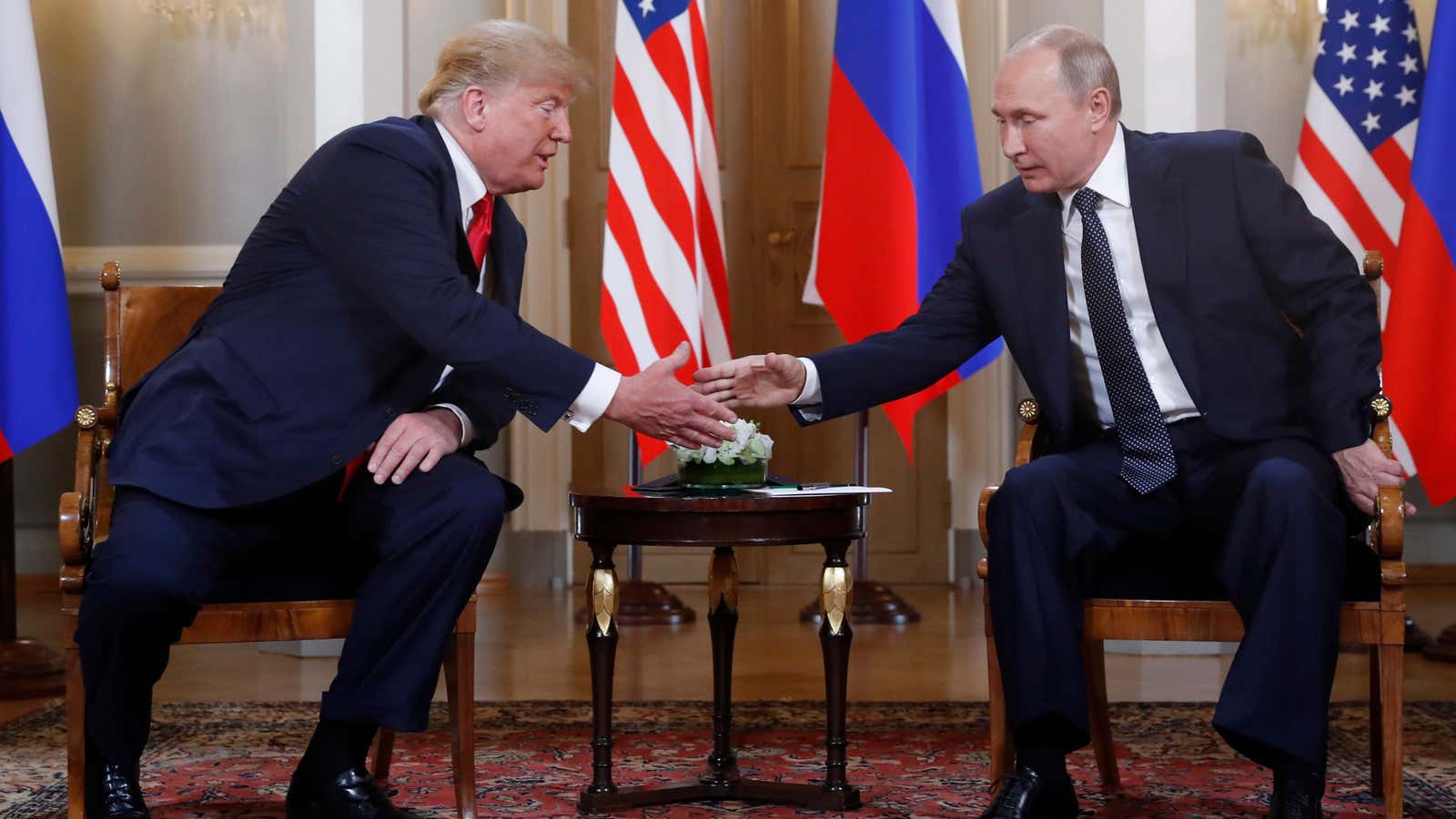When he shook hands with Donald Trump in Helsinki today, Russian president Vladimir Putin ticked off the number one item on his wishlist for US-Russia relations: his first planned summit with a US president since he returned to the presidency in 2012.
Even if nothing comes out of his one-on-one meeting with Trump, that moment is “already a gain for him,” says Angela Stent, director of Russian Studies at Georgetown University. “He is back as a respected equal of the United States after the attempts to isolate him since 2014 [when Russia annexed Crimea].” The fact that Putin made Trump wait for an hour before the summit started, and that the American spoke in glowing terms about their future relationship—without mentioning Crimea, election meddling, or the Novichok poisoning—makes Putin seem in control.
But what else is on Putin’s wishlist that may have come up in his much-anticipated private meeting with Trump? We asked Stent and prominent Russian foreign affairs columnist Vladimir Frolov.
Normalize US-Russia relations
As Stent notes, the fact that the summit is happening—the first between Putin and an US president since Putin’s return to the Russian presidency—is a big win for Putin. He will want “a statement to resume full-fledged relations and inter-government contacts, frozen by Obama in 2014,” Frolov writes in an email from Moscow. If that happens, it will be a “validation of [Putin’s] strategy to stare down the US without yielding any ground,” Frolov says.
The aim is to “make [Trump] so personally invested in a relationship with Putin, that it would be politically and personally too humiliating for Trump to revert back to confrontation when he eventually realizes that he had little to nothing to show for it,” Frolov adds. “Just as Kim played Trump in Singapore, Putin intends to play him in Helsinki. Make him feel important and happy, yield little if anything.”
Slow down on sanctions
On sanctions, Trump’s hands are tied by Congress, which passed a law last year, insisting that lawmakers must approve of any Russian sanctions relief. The Kremlin doesn’t expect sanctions to end, “but it wants to prevent further escalation of sanctions,” Frolov says. Normalizing relations will calm the business environment in Russia and encourage investors that they don’t risk losing their cash if they put money into the country.
Putin might also push for some flexibility in the way sanctions are enforced, Stent adds. She points to how the US Treasury recently eased sanctions on Russian aluminum giant Rusal.
Wiggle room on Crimea
US law also stops Trump recognizing Crimea as Russian. What Putin would like, though, is for the West to stop talking about the illegal annexation of the peninsula; overlooking the takeover would “remove it as a block to normalizing the relationship with Russia,” Frolov says.
Convince Trump that Putin can influence Iran
Trump and Putin both want the US to be out of Syria, but the US president won’t do that with Iran still active in the country. An Iranian withdrawal is “not going to happen,” Stent says. But Putin, who recently met with a top aide to Iran’s supreme leader in Moscow, “will try to persuade Trump that at least he does have some influence over Iranian actions in Syria and that he can put some pressure on Iran,” she says.
Putin’s next move, Frolov says will be to “try to insert himself between the US and Iran to mediate, facilitate and prevent the US from going to war with Iran. This will make Putin indispensable for Trump for a while.”
A surprise gift? You never know…
Trump ended his summit with Kim Jong-un with the unexpected announcement that he had promised to stop joint exercises with South Korea. He could hand Putin a similar gift, by saying he’ll stop NATO exercises in the Baltics, Stent says. Putin could then present this to Russians as a neutralization of NATO’s threat to the country.
